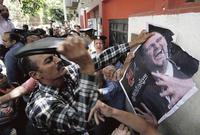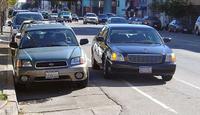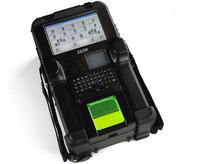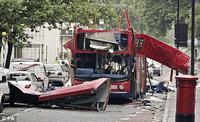-
Kansas House cuts troubled agency's role in funding of bio lab
DHS has chosen Kansas State University (KSU) in Manhattan, Kansas, as the location for the new, $650 million Level 4 BioLab, which will replace the aging lab on Plum Island, New York; the federal laboratory will be the U.S. premier facility for research into countering possible bioterrorism attacks and threats to the nation’s food supply; the Kansas Bioscience Authority (KBA) was supposed to handle the issuing of $105 million in bonds to develop the lab, but the KBA’s chief executive has recently resigned under a cloud, and the agency’s business practices are now being investigated the Johnson County District Attorney; the Kansas House voted to cut the KBA out of handling the bond issue; “We didn’t want any kind of hint of a problem,” said one House member
-
-
Don't mess with these Orlando mall cops
Far from being a piecemeal operation, security at The Mall at Millennia, a luxury mall in Orlando, Florida, is a highly sophisticated operation that uses the latest law enforcement tools, techniques, and technology; 50 unarmed security officers maintain a conspicuous presence throughout the 1.2 million square foot mall; the mall also has a comprehensive network of surveillance cameras that are monitored in a twenty-four hour command center; to prepare security personnel for emergency scenarios, the department conducts tabletop exercises with local law enforcement officials every six months; the mall also works closely with local law enforcement officials to catch local thieves and participates in sting operations
-
-
Brooklyn mosque moves forward, clears legal hurdle

A mosque in Brooklyn, New York is moving ahead with construction plans after a New York state judge dismissed a lawsuit filed by an anti-mosque organization; its construction was blocked after local residents began actively protesting stating that the religious facility would negatively affect the neighborhood; Judge Mark Partnow ruled in favor of the mosque’s proponents after Lamis Deek, the attorney representing the mosque’s builder, suggested that opposition was based on racism, going so far as to call protestors terrorists; Albery Butzel, the attorney representing Bay People, said that the organization is not anti-Muslim and insisted that the group’s opposition was based on a lack of parking
-
-
Crackdown spreads across Syria

The Syrian security forces have expanded their campaign against anti-government protesters; the number of civilian killed stands at 780, and the experts told the New York Times that the regimes has so far arrested more than 10,000 people suspected of harboring anti-regime sentiments; Sunni neighborhoods in the city of Homs, Syria’s third largest city, have been shelled; the regime continues the tactics of surrounding cities and towns with army unites, and cutting these cities off from power, communication, and the Internet; the Obama administration is edging closer to calling for an end to the long rule of the Assad family; one official said the first step would be to say for the first time that Assad has forfeited his legitimacy to rule, a major policy shift; meanwhile, international pressure has caused Syria to drop its plans to run for a seat on the UN Human Rights Council; Kuwait, which was expected to stand in 2013, will take its place
-
-
Sophisticated new gadgets helped Navy SEALs take down bin Laden
In the daring raid that killed Osama bin Laden, Navy Seals were likely outfitted with latest in high-tech weapons and gadgets; Fox News speculates on five key technologies that could have helped the highly trained members of Navy SEAL Team 6 successfully complete their mission including bomb sniffing dogs, satellite-linked helmet cameras, and modified stealth Black Hawk helicopter
-
-
DHS official: Muslims will not be profiled following bin Laden's death
In a recent meeting with local Muslims in Detroit, a senior DHS official assured Muslim-Americans that they would not be subject to racial profiling following the death of Osama bin Laden; last week in Dearborn Heights, Michigan, federal officials met with Arab-American and Muslim community leaders to answer any questions and address their concerns; local Muslims were particularly worried that they would be profiled as authorities were on a heightened state of awareness for fear of a retaliatory attack; to help ease fears, Margo Schlanger, the national head of the office of Civil Rights and Civil Liberties at DHS, assured Muslims that the government was not giving special scrutiny to any ethnic groups at this time, including Muslims
-
-
Denying foreign aid to countries with outstanding NYC parking tickets

New York City is home to 289 foreign missions and consulates, and their foreign diplomats have incurred more than $17.2 million in parking fines; these fines were issued due to safety violations, including the blocking of fire hydrants, which put the safety of NYC residents at risk; there is already a law on the books stating that 110 percent of the total unpaid parking fines owed to NYC and the District of Columbia are to be withheld from foreign aid and obligations to the countries at fault, but so far this law has not been enforced; three New York House representatives want to change that, telling other countries: pay your NYC parking tickets or forget about foreign aid
-
-
California receiving more and more DHS funding
Each year the state of California has received increasing amounts of DHS grant money to combat terrorism; last year California received $268 million dollars from the agency, roughly 16 percent of the $1.7 billion that DHS awarded nationally; San Francisco alone has received $200 million; not all Californians are pleased with the large amount of funding that the state receives from DHS; Robert Reich, President Clinton’s Secretary of Labor and a professor of public policy at U.C. Berkeley, believes that the large grants are symptomatic of wasteful government spending
-
-
Arizona police deploy iris scanners and facial biometrics to identify inmates
Local police departments in Arizona have begun using facial biometrics and iris scanning technology to identify inmates and registered sex offenders; officers with the Pinal County Sheriff’s department have entered roughly 1,500 inmates and 700 sex offenders into a national database to better identify, register, and track inmates; the scans come as part of a broader effort led by the National Sheriff’s Association (NSA) and the U.S. Justice Department; beginning in 2009, the Justice Department awarded $500,000 to help roughly forty-five law enforcement agencies throughout the United States to purchase iris scanners from BI2 Technologies
-
-
Assad intensifies crackdown

The Syrian government has intensified its crackdown on anti-government protesters over the last three days: more and more cities have been cut off from power, phone, and Internet connection, and have been surrounded by tanks and troops to prevent people from coming or leaving; a vast, nation-wide campaign of arrests and disappearances, carried out by the secret police, has so far resulted in hundreds being taken from their homes or place of employment to destinations unknown; the army has now began to use live rounds not only against demonstrators, but also against participants in funeral processions for those killed; so far, 580 civilians and about 100 soldiers and police have been killed
-
-
Cross Match's SEEK II may have identified bin Laden

SEEK II from Florida-based Cross Match is a 4-pound computer that captures photographs, complete fingerprints, and iris scans; its memory holds the images and biometrics of up to 60,000 people; unconfirmed reports suggest that the Navy SEALs who killed bin Laden used a SEEK II to identify him; there are about 5,000 SEEK II devices in the field, being used by the U.S. military, border patrol, and law enforcement agencies, and also by other militaries
-
-
Al Qaeda the deadliest terror organization in history
A new report finds al Qaeda to be the deadliest terrorist organization in history; since its founding in 1998, the organization has conducted eighty-four terrorist attacks, resulting at least 4,299 deaths and 6,300 people injured; in comparison: ETA, the Basque separatist organization in Spain, killed 820 people between 1972 and 2008; IRA attacks have killed about 1,829 people dating back to 1970; the only group that comes close in terms of deadly attacks is the Revolutionary Armed Forces of Colombia (FARC), killing 4,835 people during the course of its existence
-
-
Arizona to solicit donation to build border fence

Arizona lawmakers, saying they have lost patience with what they regard as federal dithering over the issue of building a fence along the U.S.-Mexico border, announced plans to launch a Web site which will solicit private donations for the project; donors will receive certificates declaring that the individual has “helped build the Arizona wall”
-
-
7/7 attacks could not have been prevented: report

An inquest into the 7 July 2005 attack on London transportation concluded that any suggestion MI5 could have stopped the attacks was “based to a considerable extent on hindsight”; there were failures in the response by emergency workers — confusion, a shortage of first aid supplies, and radios that did not work underground, but the report concludes that government errors had not increased the death toll
-
-
Al Qaeda's plans for 9/11 anniversary: attack U.S. rail

The treasure trove of documents, multimedia, and computers seized in the raid on bin Laden’s hideout is being exploited by intelligence experts for information on the terror network and future plots; on Thursday the FBI and DHS circulated to law enforcement units around the United States the first piece of information from the bin Laden raid: in February 2010 al Qaeda operatives discussed attacks on U.S. trains as a way to commemorate the 9/11 attacks; the discussions show that the planners, in order to achieve a maximum-casualty attack, were thinking of derailing a train so that it plunged into a ravine or fell off a bridge; the FBI-DHS Thursday warning urged local la enforcement to be circulated for clips or spikes missing from train tracks, packages left on or near the tracks, and other indications that a train could be vulnerable
-
More headlines
The long view
Factories First: Winning the Drone War Before It Starts
Wars are won by factories before they are won on the battlefield,Martin C. Feldmann writes, noting that the United States lacks the manufacturing depth for the coming drone age. Rectifying this situation “will take far more than procurement tweaks,” Feldmann writes. “It demands a national-level, wartime-scale industrial mobilization.”
No Nation Is an Island: The Dangers of Modern U.S. Isolationism
The resurgence of isolationist sentiment in American politics is understandable but misguided. While the desire to refocus on domestic renewal is justified, retreating from the world will not bring the security, prosperity, or sovereignty that its proponents promise. On the contrary, it invites instability, diminishes U.S. influence, and erodes the democratic order the U.S. helped forge.
Fragmented by Design: USAID’s Dismantling and the Future of American Foreign Aid
The Trump administration launched an aggressive restructuring of U.S. foreign aid, effectively dismantling the United States Agency for International Development (USAID). The humanitarian and geopolitical fallout of the demise of USAID includes shuttered clinics, destroyed food aid, and China’s growing influence in the global south. This new era of American soft power will determine how, and whether, the U.S. continues to lead in global development.
Water Wars: A Historic Agreement Between Mexico and US Is Ramping Up Border Tension
By Natasha Lindstaedt
As climate change drives rising temperatures and changes in rainfall, Mexico and the US are in the middle of a conflict over water, putting an additional strain on their relationship. Partly due to constant droughts, Mexico has struggled to maintain its water deliveries for much of the last 25 years, deliveries to which it is obligated by a 1944 water-sharing agreement between the two countries.
How Disastrous Was the Trump-Putin Meeting?
In Alaska, Trump got played by Putin. Therefore, Steven Pifer writes, the European leaders and Zelensky have to “diplomatically offer suggestions to walk Trump back from a position that he does not appear to understand would be bad for Ukraine, bad for Europe, and bad for American interests. And they have to do so without setting off an explosion that could disrupt U.S.-Ukrainian and U.S.-European relations—all to the delight of Putin and the Kremlin.”
How Male Grievance Fuels Radicalization and Extremist Violence
By Haily Tran
Social extremism is evolving in reach and form. While traditional racial supremacy ideologies remain, contemporary movements are now often fueled by something more personal and emotionally resonant: male grievance.
